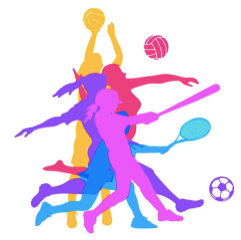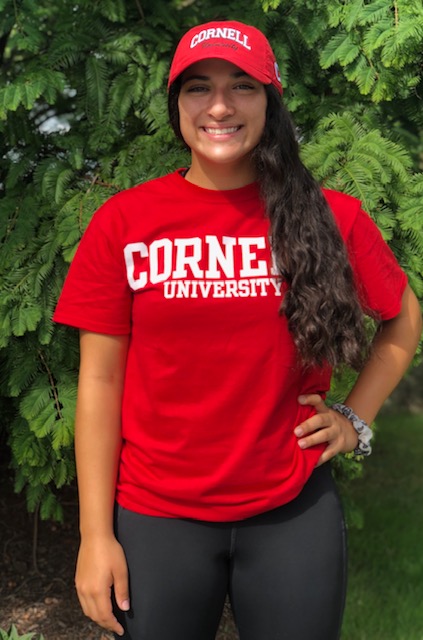Lilly Travieso is the Founder of ELLA (Empowering Leadership in Latina Athletes), a non-profit organization that helps young female athletes of Hispanic/Latino descent to achieve their goal to attend college to help offset costs for families that are economically disadvantaged that includes charitable purposes. The program also helps those to empower leadership and discipline amongst the athletes that would lead to a positive life outcome and help offset costs to attend college athletic interviews.
FWM: Tell us about your passion for softball and how it was a precursor for the confident woman you are today.
I began playing softball at the young age of six. Initially, it was my father’s idea to play because he wanted to share his passion for the game. From the moment I held the glove in my hand, I felt a special connection to the game. As years passed, I played different sports, but softball was what I gravitated to. Over time, I developed a true love and passion for the game. This relationship had its highs and lows. On the highs, this relationship took me to many places and provided me with many once-in-a-lifetime opportunities. I was able to travel to Cuba to play softball and to participate in a cultural exchange program, where I learned about the Cuban culture. This past summer, I represented Puerto Rico in the Junior National Team in the Women’s World Cup. In this tournament, I met players from different parts of the country and the world! Despite the different languages we all spoke, we all shared the same language of softball.
On the lows, this softball relationship challenged me to face my biggest fear of public speaking. Throughout my life I have struggled with being a quiet and reserved person while constantly being told to speak up. As I continued to grow as a player and a person, I became more confident, outspoken, and took charge on and off the field. Stepping up to be a captain for my travel and varsity high school Softball teams have given me the experience to speak up, take charge, be a leader and serve as a voice for my softball sisters. I continuously mentor other young athletes as they come to me for advice. What I have learned on the field transferred to my personal life which allowed me to conquer my biggest fear.
FWM: What did playing sports at a young age teach you?
Through my relationship with softball, I have learned about other cultures, met many people from different walks of life, and traveled to other countries. This has helping me to embrace and learn from others while being inclusive of all cultural backgrounds and ethnicities. I have also learned that life is a rollercoaster and the best lesson learned is to enjoy your highs and turn your lows into learning opportunities!
Playing sports at a young age has taught me work ethics, discipline, patience, and resilience. Most importantly, it has taught me failure. Dealing and accepting moments of failure is incredibly important to having long-term success!
FWM: Share a few of your challenges when growing up.
One of the greatest challenges I faced growing up was experiencing the obvious inequalities in female sports. As a female athlete, I first played baseball due to absence of softball teams in my age group within the league. When I played little league all-stars, our softball team received hand-me-downs in comparison to the brand-new uniforms given to the boys’ baseball teams. We often competed in make-shift fields, while the boys played in stadium like fields. It was inequalities like these that made me work harder to achieve my dream of playing at the highest level. These inequalities definitively challenged as I set to pursue my dream, but nonetheless, didn’t define me.
As I began to explore competitive softball and explore my college options, this softball relationship made me realize the harsh inequalities that exists in the softball community for Latina Athletes. For instance, to play competitively and gain exposure to universities as a softball player, you must be in a top travel team, attend college camps, get specialized training, have a professional recruitment video, travel to unofficial visits, take college preparatory courses, participate in showcase tournaments throughout the country, own expensive equipment and
uniforms, which all require a large sum of money.
FWM: Tell us about why you started, ELLA (Empowering Leadership in Latina Athletes).
When I decided I wanted to play softball in a top university, I embarked on an extremely strenuous mental, physical and academic journey. My own athletic and academic journey motivated me to create the ELLA Sports Foundation. My goal is to help level the playing field for young female Latina athletes. I want young Latina athletes like myself to have the same opportunities and experiences I had, but most of all, I want all them to have the mentorship and support they need as they embark their own athletic, academic and professional journey.
The role of the foundation is to support young female Latinas to become leaders of tomorrow through sports and academic excellence. The ELLA Foundation (Empowering Leadership in Latina Athletes) works on developing leadership in Latina athletes through education, training, mentorship, and advocacy in the sports community.
Financial inequality has been a challenge to many in the Latina Community. Please share your thoughts.
When I started playing competitive softball and began to explore my college options, I realized the many financial disparities that exist in the softball community for Latina Athletes. There is a heavy burden associated with financial expenses for athletes as they play competitively and began to explore college options. This financial burden is tied to travel club fees, uniforms, equipment, coaching, physical conditioning, athletic camps, SAT/ACT prep classes, as well as all the expenses associated with traveling.
My own experience of living in a middle-class household required my family to live in a tight budget to be able to afford my own travel softball expenses and get the exposure I needed. My Christmas wish list always included: bats, gloves, and cleats to be able to offset some of the costs from my parents. One thing that has puzzled me over the years, is how other young Latina athletes living in a similar or lower-class household could afford all these expenses to be prepared and have the same college options I had? Don’t they all have a dream?
FWM: What programs are offered by ELLA
The foundation is expanding relationships with the Latino community by developing programs that will increasing awareness and knowledge. There is a huge misconception among the Latino community about being able to afford private high schools and or top universities.
The ELLA foundation works on bridging this gap of knowledge with the ultimate goal to support young female Latinas to become leaders of tomorrow through sports and academic excellence. Through our programs we work on developing leadership in Latina athletes through education, training, mentorship, and advocacy in the sports community.
FWM: Tell us about the mentorship sessions and why they are so important.
As the voice of ELLA, I help young female athletes by sharing my own struggles and accomplishments throughout my recruitment journey. I bring knowledge and awareness that Latinas can have the same opportunities if we are educated and feel empowered. Empowering young girls promotes a TRUE, yes you can mentality. By experiencing firsthand opportunities that sports can bring to their lives, they will ultimately impact their future.
FWM: Share a few success stories.
Softball has always been a healthy outlet for me to learn and grow from. Being an athlete at a young age provided me with many once-in-a-lifetime opportunities. When I was fourteen years old, I traveled to Cuba to play softball against the Cuban Olympic team and participated in a cultural exchange program. I also represented Puerto Rico in the Junior Olympic National Team in the Women’s World Cup 19U Division when I was seventeen years old. Thanks to softball, these experiences allowed me to play against different countries and represent my heritage at a competitive international level
FWM: What are you most proud of?
I am a first-generation Hispanic American with a multicultural background: Salvadorian, Puerto Rican, and Cuban. My mother immigrated to the United States from El Salvador and my father is Puerto Rican with Cuban roots.
One of my proudest moments was being selected for the Puerto Rico National Junior Olympic softball team. This allowed me to play against different countries and represent my heritage at a competitive international level. I achieved my dream of committing and playing for a D1 Ivy league program, Cornell University. As the founder of ELLA, I’m also proud to give back to my community by leveling the playing field for Latina athletes everywhere.
FWM: Share your goals/initiatives as we move towards the Fall.
As we continue to bring awareness and support locally, I hope to expand nationally and internationally. One of our goals is to establish ELLA clubs in high schools. This will carry on our mission and vision to support young female Latinas to become leaders of tomorrow through sports and academic excellence. On the international scale, we strive to reach underserved Latina athletes in various countries.
FACEBOOK: Ella
TWITTER: @foundationella
INSTAGRAM: @ella_sports_foundation
https://ellasportsfoundation.org





